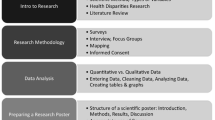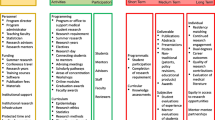Abstract
INTRODUCTION: Few curricula train medical students to engage in health system reform.
AIM: To develop physician activists by teaching medical students the skills necessary to advocate for socially equitable health policies in the U.S. health system.
SETTING: Montefiore Medical Center, the University Hospital of the Albert Einstein College of Medicine, Bronx, NY.
PROGRAM DESCRIPTION: We designed a 1-month curriculum in research-based health activism to develop physician activists. The annual curriculum includes a student project and 4 course sections; health policy, research methods, advocacy, and physician activists as role models; taught by core faculty and volunteers from academic institutions, government, and nongovernmental organizations.
PROGRAM EVALUATION: From 2002 to 2005, 47 students from across the country have participated. Students reported improved capabilities to generate a research question, design a research proposal, and create an advocacy plan.
DISCUSSION: Our curriculum demonstrates a model for training physician activists to engage in health systems reform.
Similar content being viewed by others
References
Rothman D. Medical professionalism—focusing on the real issues. N Engl J Med. 2000;342:1284–6.
Medical Professionalism Project. Medical professionalism in the new millennium: a physician charter. Ann Intern Med. 2002;136:243–6.
Medical School Objectives Writing Group. Learning objectives for medical student education—guidelines for medical schools: report I of the medical school objectives project. Acad Med. 1999;74:13–8.
The ACGME Outcome Project. http://www.acgme.org/outcome/project/proHome.asp. Accessed April 20, 2005.
Gruen RL, Pearson SD, Brennan TA. Physician-citizens—public roles and professional obligations. JAMA. 2004;291:94–8.
Flynn MB. Power, professionalism, and patient advocacy. Am J Surg. 1995;170:407–9.
Wynia MK, Latham SR, Kao AC, Berg JW, Emanuel LL. Medical professionalism in society. N Engl J Med. 1612;341:1612–6.
Sullivan WM. What is left of professionalism after managed care? Hastings Cent Rep. 1999;29:7–13.
Mechanic D. Managed care and the imperative for a new professional ethic. Health Affairs. 2000;19:100–11.
Whitcomb ME. Future doctors should learn about our country’s health care system. Acad Med. 2004;79:105–6.
Coulehan J, Williams PC, Van McCrary S, Belling C. The best lack all conviction: biomedical ethics, professionalism, and social responsibility. Camb Quart Healthcare Ethics. 2003;12:21–38.
Swick HM, Szenas P, Danoff D, Whitcomb ME. Teaching professionalism in undergraduate medical education. JAMA. 1999;282:830–2.
Finkel ML, Fein O. Teaching about the changing U.S. health care system: an innovative clerkship. Acad Med. 2004;79:179–82.
Curricula CoBaSSiMS, Medicine Io. Improving Medical Education: Enhancing the Behavioral and Social Science Content of Medical School Curricula. Washington, DC: National Academies Press; 2004.
Tepper O, Lurie P, Wolfe S. Courses in research-based health activism. Virtual Mentor. Ethics Resource Center, American Medical Association. January 2004; 6(1) http://www.ama-assn.org/ama/pub/category/11778.html. Accessed August 15, 2006.
http://www.citizen.org/hrg/activistcour/index.cfm. Accessed March 3, 2006.
Association AMS. The Paul Ambrose Political Leadership Institute. http://www.amsa.org/hp/hpli.cfm. Accessed April 5, 2006.
Bobo KA, Kendall J, Max S. Organizing for Social Change: Midwest Academy Manual for Activists. 3rd edition. Washington, DC: Seven Locks Press; 2001.
Ludmerer KM. Instilling professionalism in medical education. JAMA. 1999;282:881–2.
Hafferty FW, Franks R. The hidden curriculum, ethics teaching, and the structure of medical education. Acad Med. 1994;69:861–71.
Cohen JJ. Our compact with tomorrow’s doctors. Paper presented at Association of American Medical Colleges, 112th Annual Meeting, November 4, 2001. Washington, DC.
Author information
Authors and Affiliations
Corresponding author
Additional information
No conflicts of interest to declare.
Primary Funding Source: We received financial support from the Soros Foundation through an educational grant from Public Citizen. Dr. Cha was a scholar in the Robert Wood Johnson Clinical Scholars Program at Yale University and sponsored by the U.S. Department of Veteran Affairs and Dr. Ross was a scholar in the Robert Wood Johnson Clinical Scholars Program at Yale University and sponsored by the Robert Wood Johnson Foundation during their project involvement. Neither the Soros Foundation nor the Robert Wood Johnson Foundation had any role in the design or conduct of the study; collection, management, analysis or interpretation of the data; or preparation, review or approval of the manuscript.
Dr. Cha’s contact information is provided for correspondence purposes only; his contribution to the cohort is based on work prior to joining the Committee on Government Reform of the U.S. House of Representatives.
Rights and permissions
About this article
Cite this article
Cha, S.S., Ross, J.S., Lurie, P. et al. Description of a research-based health activism curriculum for medical students. J GEN INTERN MED 21, 1325–1328 (2006). https://doi.org/10.1111/j.1525-1497.2006.00608.x
Received:
Revised:
Accepted:
Issue Date:
DOI: https://doi.org/10.1111/j.1525-1497.2006.00608.x




